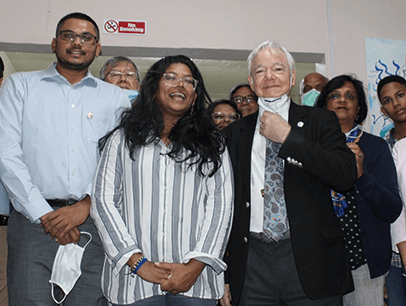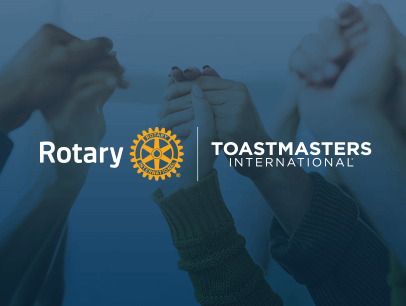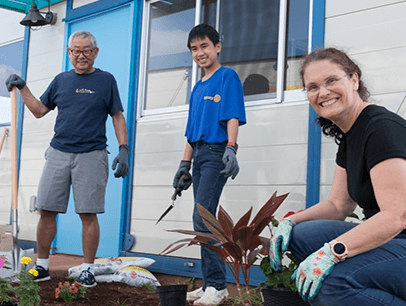It could be said that the groundwork for the Rotary/Toastmasters alliance was laid in 1905, when two visionary leaders had a similar idea—to create organizations where individuals could share ideas, form lasting friendships, improve their skills, and act to serve their communities.
In 1905, Paul Harris founded Rotary International, a businessmen’s group that ultimately expanded its mission to worldwide humanitarian service. That same year, Ralph Smedley convened the first unofficial Toastmasters meeting. In 1924, he started the organization that would become Toastmasters International.
In 2019, Toastmasters and Rotary formed an alliance to capitalize on this long history of shared strengths and often-parallel purposes. Clubs in both organizations have been connecting ever since, and are now stepping up efforts to educate and collaborate with each other.
Carrie Goldbeck, membership engagement supervisor and alliance liaison for Rotary International, describes the four-year strategic partnership as “an ongoing, mutually beneficial relationship that offers opportunities for personal and professional growth for members of both organizations, including through grassroots collaborations.”
Alliance collaborations have led to project-sharing, chartering clubs that blend members from both organizations, and co-sponsoring widespread education efforts for both Toastmasters and Rotary members on how the alliance can work. Clubs and members actively engaged in alliance activities enthusiastically endorse it. Here are just a few of their stories.
 Anastasia Persico (left), a member of the Rotary Network for Empowering Women Club, and Kathi Zwicker, a member of the Women Changemakers Toastmasters club, were part of an alliance speaking tour in Maritime Canada.
Anastasia Persico (left), a member of the Rotary Network for Empowering Women Club, and Kathi Zwicker, a member of the Women Changemakers Toastmasters club, were part of an alliance speaking tour in Maritime Canada.
Close Connections
Kathi Zwicker, a Toastmaster and Rotarian, says the connections between members of the two organizations, be they business, personal, or intra-club, are invaluable.
When Zwicker learned about the partnership, she immediately saw Toastmasters and Rotary members as kindred spirits, with matching energies and interests. She is a member of Fredericton North Rotary in Fredericton, New Brunswick, Canada, and President of the online Women Changemakers Toastmasters club, which has encouraged numerous Rotary-Toastmasters speaking activities.
 Anastasia Persico, a Rotary member, spoke at Toastmasters, Rotary, and public events in Maritime Canada. Here, she’s shown at a Speakers Corner event.
Anastasia Persico, a Rotary member, spoke at Toastmasters, Rotary, and public events in Maritime Canada. Here, she’s shown at a Speakers Corner event.Earlier this year, Changemakers and Fredericton North coordinated an alliance tour. Anastasia Persico, a member of the Rotary Network for Empowering Women (RNEW) Club, spoke at various Toastmasters, Rotary, and public events throughout Maritime Canada.
After the Rotary/Toastmasters alliance launched, Toastmasters created a modified educational curriculum for Rotary members, available on their website. It’s composed of leadership-development courses that reflect the content in projects from various paths in Toastmasters’ Pathways program (though the courses are not as in-depth as the Pathways projects for Toastmasters).
Recently, Marina Kirsch, DTM, hosted an online webinar to explain the alliance, answer questions, and provide the perspectives of both Toastmasters and Rotary members. Zwicker, who also participated in the webinar, explained Pathways and how it specifically serves the needs and goals of both groups. Based on your path and elective selections, projects in Levels 1–3 will support alliance collaborations, with topics like mentoring basics, consensus-building, and how to use your communication style to work successfully with others.
Pathways projects provide the structure for both groups to take on what Zwicker calls “Big Hairy Audacious Goals.” When a Rotary club takes on a large service project, members in a Toastmasters club can apply a Pathways project—like helping with public relations or developing a marketing plan. By pairing up in this way, members of both organizations are bringing their skills and interests together for a successful collaboration.
“Pathways gives us the system, direction, and resources to connect with Rotarians and collaborate on a big step-by-step project. Everyone wins,” says Toastmaster Walter J. Smith, DTM, who served as the webinar panel moderator.
Even unofficial connections between Rotary members and Toastmasters have value, Zwicker says. “We don’t necessarily have to be members of each other’s clubs. We can be friends and partners in a relationship based on sharing ideas of how to make the world better.”
 Toastmaster Papa Arkhurst (seated at the right end of the first row, in blue) and Rotary member Yvonne Kumoji-Darko (seated to his left) attend a joint induction ceremony for members of the Rotary Club of Accra-SpeakMasters and the New Age Toastmasters Club, both in Accra, Ghana. Arkhurst and Kumoji-Darko led the chartering of the two clubs.
Toastmaster Papa Arkhurst (seated at the right end of the first row, in blue) and Rotary member Yvonne Kumoji-Darko (seated to his left) attend a joint induction ceremony for members of the Rotary Club of Accra-SpeakMasters and the New Age Toastmasters Club, both in Accra, Ghana. Arkhurst and Kumoji-Darko led the chartering of the two clubs.
Mutual Mindsets in Ghana
Toastmasters gave Papa Arkhurst, DTM, one of his earliest platforms to try to make the world a better place. He began searching for “something more in life” while pursuing his master’s degree. He wanted to become a motivational speaker and, in 2011, joined his first club, KH Toastmasters in Hyehwadong, Seoul, South Korea. “I loved it, I was obsessed with it,” he remembers.
At the time, Ghana had one club, a situation Arkhurst was determined to change. He eventually sponsored 19 clubs in his country, but he wanted to do more. When he learned about the Rotary/Toastmasters alliance, he quickly realized how it could unite the talents of both groups in humanitarian service and elevate Toastmasters’ visibility in Ghana.
At about the same time, Yvonne Kumoji-Darko, then 2020–2021 District Governor of Rotary 9102 (Benin, Ghana, Niger, and Togo), attended a Rotary leadership training event and was intrigued by the talk she heard about embracing change and new club models.
She went to a Toastmasters event in Accra, Ghana, to talk to Arkhurst about alliance opportunities, and Arkhurst was on board immediately.
Ultimately, Arkhurst and Kumoji-Darko helped drive efforts culminating in the chartering of two clubs. Rotary Club of Accra-SpeakMasters counts Toastmasters among its members; New Age Toastmasters Club members include Rotarians and Rotaractors (a distinct membership for those 18 and older). The stage is set for ample collaborative opportunities for the clubs, Kumoji-Darko says.
Arkhurst acknowledges what he describes as “cultural” differences in the way Toastmasters and Rotary clubs operate. While the two share philosophical ideals, Rotary clubs, by their very nature, have their own format and purpose, just as Toastmasters clubs do.
“For example, Rotarians are used to fundraising to support their causes. Toastmasters don’t—can’t—do that,” he notes. “On the other hand, the Pathways program is self-directed. Clubs support and mentor personal development but no one is teaching in the traditional sense. Rotarians may struggle a bit with that transition.” He then adds that Toastmasters clubs, structured around the help of colleagues and mentors, are designed to bridge that transition.
However, Arkhurst also sees the differences between the two groups as an invaluable mini-experience in change management. The alliance allows Toastmasters and Rotary members to honor long-standing priorities, yet also look for beneficial adaptations.
“The world is changing. Younger people like to collaborate; they are attracted to dabbling in new ideas and mastering new skill sets,” he says. They care about world issues. In fact, recent studies have shown that upcoming generations are optimistic, and willing to speak out and act on humanitarian causes they believe in.
That could make synergistic Toastmasters-Rotary partnerships, with myriad global opportunities, attractive to young people for years to come, Arkhurst adds.
The “Lark Spark”
Mary Shackleton, a fourth-generation Rotarian, was in Hamburg, Germany, for Rotary’s 2019 annual international convention when she heard then-Toastmasters International President Lark Doley, DTM, speak about the new Rotary/Toastmasters alliance, and the galvanizing opportunities it posed for both organizations.
Shackleton, who had briefly been a member of the Toastmasters’ Cleveland Club in Ohio before moving for a job, was intrigued. “I call it my ‘Lark Spark,’” she laughs. “I had been in enough Rotary meetings to know that we could benefit from Toastmasters.”
In the 2020–2021 program year, Shackleton, then a Rotary District Governor, and her friend Patricia Kidwingira, DTM, Toastmasters’ District 46 Director at the time, had an ambitious idea. It was the middle of the pandemic; clubs in both organizations needed a big dose of positive purpose. The two women wondered—could they charter a new club with Toastmasters and Rotary members?
“Patricia and I literally dared one another to do it, then tapped our respective networks,” Shackleton says. The fledging club was advised by senior Toastmasters, including past region and District leaders, and Rotary leaders. After months of joint preparation, Goodwill Toastmasters chartered in 2021 as a District 46 online club, with renewed Toastmaster Shackleton as its first Club President.
Past International President Ted Corcoran, DTM, attended Goodwill’s first official meeting and “even evaluated my Ice Breaker,” Shackleton notes. “With such lavish attention, failure was not an option!”
The club, composed of Toastmasters, Rotarians, and Rotaractors, has won numerous District awards and in 2022–2023 was recognized as a President’s Distinguished Club, reaching a “perfect 10” of award requirements. Shackleton believes that the inclusion of members from both organizations is a key to Goodwill’s success.
Shackleton is also an ambassador for the Empowering Girls Initiative, a collaborative effort between Toastmasters and Rotary members to host communication workshops for young women, using Toastmasters’ Young Leadership Program (YLP) curriculum. The program offers a time-tested course and highlights yet another example of the value of shared Rotary-Toastmasters resources, Shackleton adds.
For more information on the alliance and each organization, visit the Toastmasters website and the Rotary website.
Stephanie Darling is a former senior editor of and frequent contributor to the Toastmaster magazine.
Related Articles

Club Experience
Toastmasters and Rotary: Stronger Together

Toastmasters News
Toastmasters and Rotary Team Up

Toastmasters News



 Previous
Previous

 The Alliance: What’s in It for Me?
The Alliance: What’s in It for Me?
 Previous Article
Previous Article